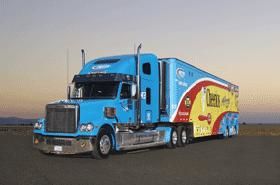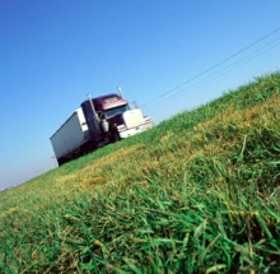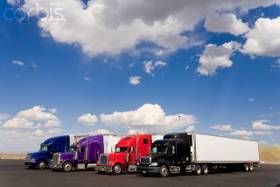CDL When Out Of State???? What About All The Federal Crap?
Topic 3568 | Page 1

I have my FL CDL Class A Permit but have been told I'll have to get whatever state the school is in's license to get the actual CDL Class A license because of the driving test. In July I was told that was going to change. May help you in the long run to have the knowledge but money wise will be cheaper to wait to get the license in the school's state.
CDL:
Commercial Driver's License (CDL)
A CDL is required to drive any of the following vehicles:
- Any combination of vehicles with a gross combined weight rating (GCWR) of 26,001 or more pounds, providing the gross vehicle weight rating (GVWR) of the vehicle being towed is in excess of 10,000 pounds.
- Any single vehicle with a GVWR of 26,001 or more pounds, or any such vehicle towing another not in excess of 10,000 pounds.
- Any vehicle, regardless of size, designed to transport 16 or more persons, including the driver.
- Any vehicle required by federal regulations to be placarded while transporting hazardous materials.
It's really kind of simple. Wherever you go to for your training is where your license will be issued. As soon as you go home for your first home-time, you will simply go to the DMV and get it transferred over to your home state. Don't worry about your permit being from a different state, the folks at the training center you are going to know how to handle all this stuff - they do it every day. Some states make it a little more difficult to transfer your CDL than others, but you can still do it this way.
CDL:
Commercial Driver's License (CDL)
A CDL is required to drive any of the following vehicles:
- Any combination of vehicles with a gross combined weight rating (GCWR) of 26,001 or more pounds, providing the gross vehicle weight rating (GVWR) of the vehicle being towed is in excess of 10,000 pounds.
- Any single vehicle with a GVWR of 26,001 or more pounds, or any such vehicle towing another not in excess of 10,000 pounds.
- Any vehicle, regardless of size, designed to transport 16 or more persons, including the driver.
- Any vehicle required by federal regulations to be placarded while transporting hazardous materials.
Dm:
Dispatcher, Fleet Manager, Driver Manager
The primary person a driver communicates with at his/her company. A dispatcher can play many roles, depending on the company's structure. Dispatchers may assign freight, file requests for home time, relay messages between the driver and management, inform customer service of any delays, change appointment times, and report information to the load planners.DMV:
Department of Motor Vehicles, Bureau of Motor Vehicles
The state agency that handles everything related to your driver's licences, including testing, issuance, transfers, and revocation.

Interstate means you have to have your medical card with you every time your in the rig. The company your with needs to know when your card expires intrastate means the same state your in. Over the road your going to have to deal with DOT inspections to deal with DOT pre trips. They will flag for anything that is wrong with your rig. You have to maintain a logbook hopefully you have an electronic one so they add up to 24 hours. With paper log everything has to be perfect. Have to double check your brakes, your driving time, 11 hour rule and a 14. No matter what you cannot be 11 hours driving without your 10 hour break. Some states like Vermont have very strict rules on where semis can travel. Other states and cities are worth avoiding all together because of traffic or construction if at all possible for your route plan. Keep in mind most companies will want you to be as efficient as possible. Another thing to factor is a lot of companies will give a fuel bonus if you meet the required fuel economy. Certain engines you may never get the fuel economy that they want. The max force engine great on economy lacks power and mountainess terrain of loads of 10 tons or more. Cummings engines will provide a good balance of power and economy. Detroit diesels have power but lack economy. Trucks with cat engines come in two categories awesome power, crap economy, or mediocre power in great economy. Another factor is heat many companies run retreads and they can literally fall apart while your driving in warmer weather event though they passed the pre-trip that morning. These are the biggest factors I think when you leave state lines.
Logbook:
A written or electronic record of a driver's duty status which must be maintained at all times. The driver records the amount of time spent driving, on-duty not driving, in the sleeper berth, or off duty. The enforcement of the Hours Of Service Rules (HOS) are based upon the entries put in a driver's logbook.
Over The Road:
Over The Road
OTR driving normally means you'll be hauling freight to various customers throughout your company's hauling region. It often entails being gone from home for two to three weeks at a time.
DOT:
Department Of Transportation
A department of the federal executive branch responsible for the national highways and for railroad and airline safety. It also manages Amtrak, the national railroad system, and the Coast Guard.
State and Federal DOT Officers are responsible for commercial vehicle enforcement. "The truck police" you could call them.
Interstate:
Commercial trade, business, movement of goods or money, or transportation from one state to another, regulated by the Federal Department Of Transportation (DOT).
Intrastate:
The act of purchasers and sellers transacting business while keeping all transactions in a single state, without crossing state lines to do so.

Interstate means you have to have your medical card with you every time your in the rig. The company your with needs to know when your card expires intrastate means the same state your in. Over the road your going to have to deal with DOT inspections to deal with DOT pre trips. They will flag for anything that is wrong with your rig. You have to maintain a logbook hopefully you have an electronic one so they add up to 24 hours. With paper log everything has to be perfect. Have to double check your brakes, your driving time, 11 hour rule and a 14. No matter what you cannot be 11 hours driving without your 10 hour break. Some states like Vermont have very strict rules on where semis can travel. Other states and cities are worth avoiding all together because of traffic or construction if at all possible for your route plan. Keep in mind most companies will want you to be as efficient as possible. Another thing to factor is a lot of companies will give a fuel bonus if you meet the required fuel economy. Certain engines you may never get the fuel economy that they want. The max force engine great on economy lacks power and mountainess terrain of loads of 10 tons or more. Cummings engines will provide a good balance of power and economy. Detroit diesels have power but lack economy. Trucks with cat engines come in two categories awesome power, crap economy, or mediocre power in great economy. Another factor is heat many companies run retreads and they can literally fall apart while your driving in warmer weather event though they passed the pre-trip that morning. These are the biggest factors I think when you leave state lines.
Colorado requires "proof of residence" to get a license.... I was just wondering if I go to Utah with a Colorado Permit what happens after the drive test? Thank you for that other information...
Logbook:
A written or electronic record of a driver's duty status which must be maintained at all times. The driver records the amount of time spent driving, on-duty not driving, in the sleeper berth, or off duty. The enforcement of the Hours Of Service Rules (HOS) are based upon the entries put in a driver's logbook.
Over The Road:
Over The Road
OTR driving normally means you'll be hauling freight to various customers throughout your company's hauling region. It often entails being gone from home for two to three weeks at a time.
DOT:
Department Of Transportation
A department of the federal executive branch responsible for the national highways and for railroad and airline safety. It also manages Amtrak, the national railroad system, and the Coast Guard.
State and Federal DOT Officers are responsible for commercial vehicle enforcement. "The truck police" you could call them.
Interstate:
Commercial trade, business, movement of goods or money, or transportation from one state to another, regulated by the Federal Department Of Transportation (DOT).
Intrastate:
The act of purchasers and sellers transacting business while keeping all transactions in a single state, without crossing state lines to do so.

Interstate means you have to have your medical card with you every time your in the rig. The company your with needs to know when your card expires intrastate means the same state your in. Over the road your going to have to deal with DOT inspections to deal with DOT pre trips. They will flag for anything that is wrong with your rig. You have to maintain a logbook hopefully you have an electronic one so they add up to 24 hours. With paper log everything has to be perfect. Have to double check your brakes, your driving time, 11 hour rule and a 14. No matter what you cannot be 11 hours driving without your 10 hour break. Some states like Vermont have very strict rules on where semis can travel. Other states and cities are worth avoiding all together because of traffic or construction if at all possible for your route plan. Keep in mind most companies will want you to be as efficient as possible. Another thing to factor is a lot of companies will give a fuel bonus if you meet the required fuel economy. Certain engines you may never get the fuel economy that they want. The max force engine great on economy lacks power and mountainess terrain of loads of 10 tons or more. Cummings engines will provide a good balance of power and economy. Detroit diesels have power but lack economy. Trucks with cat engines come in two categories awesome power, crap economy, or mediocre power in great economy. Another factor is heat many companies run retreads and they can literally fall apart while your driving in warmer weather event though they passed the pre-trip that morning. These are the biggest factors I think when you leave state lines.
Colorado requires "proof of residence" to get a license.... I was just wondering if I go to Utah with a Colorado Permit what happens after the drive test? Thank you for that other information...
Logbook:
A written or electronic record of a driver's duty status which must be maintained at all times. The driver records the amount of time spent driving, on-duty not driving, in the sleeper berth, or off duty. The enforcement of the Hours Of Service Rules (HOS) are based upon the entries put in a driver's logbook.
Over The Road:
Over The Road
OTR driving normally means you'll be hauling freight to various customers throughout your company's hauling region. It often entails being gone from home for two to three weeks at a time.
DOT:
Department Of Transportation
A department of the federal executive branch responsible for the national highways and for railroad and airline safety. It also manages Amtrak, the national railroad system, and the Coast Guard.
State and Federal DOT Officers are responsible for commercial vehicle enforcement. "The truck police" you could call them.
Interstate:
Commercial trade, business, movement of goods or money, or transportation from one state to another, regulated by the Federal Department Of Transportation (DOT).
Intrastate:
The act of purchasers and sellers transacting business while keeping all transactions in a single state, without crossing state lines to do so.

It's really kind of simple. Wherever you go to for your training is where your license will be issued. As soon as you go home for your first home-time, you will simply go to the DMV and get it transferred over to your home state. Don't worry about your permit being from a different state, the folks at the training center you are going to know how to handle all this stuff - they do it every day. Some states make it a little more difficult to transfer your CDL than others, but you can still do it this way.
Ok that makes sense (I think) the feds are getting out of control ....
CDL:
Commercial Driver's License (CDL)
A CDL is required to drive any of the following vehicles:
- Any combination of vehicles with a gross combined weight rating (GCWR) of 26,001 or more pounds, providing the gross vehicle weight rating (GVWR) of the vehicle being towed is in excess of 10,000 pounds.
- Any single vehicle with a GVWR of 26,001 or more pounds, or any such vehicle towing another not in excess of 10,000 pounds.
- Any vehicle, regardless of size, designed to transport 16 or more persons, including the driver.
- Any vehicle required by federal regulations to be placarded while transporting hazardous materials.
Dm:
Dispatcher, Fleet Manager, Driver Manager
The primary person a driver communicates with at his/her company. A dispatcher can play many roles, depending on the company's structure. Dispatchers may assign freight, file requests for home time, relay messages between the driver and management, inform customer service of any delays, change appointment times, and report information to the load planners.DMV:
Department of Motor Vehicles, Bureau of Motor Vehicles
The state agency that handles everything related to your driver's licences, including testing, issuance, transfers, and revocation.

Actually, each state has its own rules...so when you decide where you are going to school, simply ask the recruiter what the rules are...can you get your permit in your home state, or do you need to wait until you get to school....BUT you can study for all of them HERE !!! here's a link High Road Training Program So welcome to TT...now get crackin' on that studying, buster......
CDL:
Commercial Driver's License (CDL)
A CDL is required to drive any of the following vehicles:
- Any combination of vehicles with a gross combined weight rating (GCWR) of 26,001 or more pounds, providing the gross vehicle weight rating (GVWR) of the vehicle being towed is in excess of 10,000 pounds.
- Any single vehicle with a GVWR of 26,001 or more pounds, or any such vehicle towing another not in excess of 10,000 pounds.
- Any vehicle, regardless of size, designed to transport 16 or more persons, including the driver.
- Any vehicle required by federal regulations to be placarded while transporting hazardous materials.
Kevin, when you are at a company sponsored school they are providing lodging for you and that location will be considered your address as far as getting your license goes, then when you return home you will simply transfer it just like someone who just moved to the area. I agree with what StarCar said but with the caveat that many recruiters don't really know the proper answers for some of this stuff. If it were me, I would get my permit in hand before I went - trust me the folks at the school know how to handle it from there.

If you go with Pam in Indiana at Drivers Solution you will get an Indiana license. It's because of the road test to get your CDL Class A license. You will then go home and get your home state license back.
CDL:
Commercial Driver's License (CDL)
A CDL is required to drive any of the following vehicles:
- Any combination of vehicles with a gross combined weight rating (GCWR) of 26,001 or more pounds, providing the gross vehicle weight rating (GVWR) of the vehicle being towed is in excess of 10,000 pounds.
- Any single vehicle with a GVWR of 26,001 or more pounds, or any such vehicle towing another not in excess of 10,000 pounds.
- Any vehicle, regardless of size, designed to transport 16 or more persons, including the driver.
- Any vehicle required by federal regulations to be placarded while transporting hazardous materials.
New Reply:
New! Check out our help videos for a better understanding of our forum features

















Preview:








 TT On Facebook
TT On Facebook
I want to get my permit in Colorado how does all this work now with all the new "rules" if you are out of state going to school for a CDL????? just a bit confused on that aspect
CDL:
Commercial Driver's License (CDL)
A CDL is required to drive any of the following vehicles: